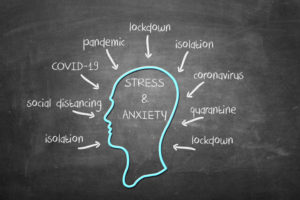
COVID Suicide Rates Dropped Despite Challenges
Despite the rise in depression and anxiety symptoms, firearm sales, and drug and alcohol use, US suicide rates during COVID actually fell 6% last year, the largest annual decline in four decades.
While we’ve all watched our fair share of disaster movies — Titanic, The Day After Tomorrow, The Perfect Storm, and probably the most relevant in light of recent events, Contagion — nothing could have fully prepared us for navigating a once-in-a-lifetime pandemic in real-time.
A disrupter of relationships, regular schedules, how we work, play, shop, travel, and attend classes and religious services, COVID has forced everyone to improvise again and again in an effort to stop the spread.
Not surprisingly, the increased isolation, along with economic challenges, traumatic loss of life, and seemingly nonstop pressure placed upon the helpers (healthcare and frontline workers in particular), caused the depression rate to more than triple according to a new study.
In surveys conducted prior to COVID, 9% of respondents reported depressive symptoms. Once COVID surfaced, however, the percentage rose to 28% for the general population. Additionally, for individuals experiencing financial pressure, the numbers skewed even higher. Of those with a household income of less than $20,000, 47% reported experiencing depression symptoms. Another 41% with a household savings of less than $5,000 acknowledged depression symptoms as well.
Despite the rise in depression and anxiety symptoms, firearm sales, and drug and alcohol use, US suicide rates during COVID actually fell 6% last year, the largest annual decline in four decades. COVID suicides were also the lowest number of suicide-related deaths since 2015, according to new data from the Centers of Disease Control (CDC).
COVID-19 Mental Health Impact
Considering the aforementioned rise in mental health challenges during COVID, the drop in suicide deaths may seem surprising. But for a number of experts who cite similar snapshots of history including the Spanish flu pandemic of 1918, the sense of community and belonging that happens during a crisis has a real impact on suicide prevention.

Another difference-maker is increased openness in people expressing their true feelings during a season of extreme change and unrest. For whatever reason — whether it’s an increase in urgency, a wake-up call of sorts, in reaching out during a pandemic, or the increased accessibility of mental health services through telehealth visits — suicide rates may be positively affected by individuals seeking out treatment.
A shift in priorities, including the need for self-care, mindfulness, and finding new ways to have meaningful connections with friends and family, was also cited as a contributor to a pattern of healthy behaviors that support positive mental health.
With increased resources more readily and easily available, suicide prevention and investments in society’s mental health can remain a priority.
Suicide Prevention Is a Post-Pandemic Priority
As pandemic restrictions have lessened and our lives are still slowly returning to normal, many in the medical community, along with mental health experts, have noted a few positive outcomes from COVID-19. Some insights are so valuable, the hope is for them to become the new standard.
In addition to the benefits of making healthcare available remotely via Zoom and other telehealth resources, the emphasis on taking mental health seriously — even post-pandemic — is a huge win.
Noting how many will continue to battle anxiety, depression, foggy mind, or post-traumatic stress disorder in light of long COVID symptoms, experts at Yale Medicine agree that COVID’s recovery process won’t happen overnight. But with increased resources more readily and easily available, suicide prevention and investments in society’s mental health can remain a priority.
While society at large can have a short memory, once a harrowing situation like COVID has improved, many hope that people’s shifting of priorities will lead to meaningful (and lasting!) changes moving forward. This could include better work/life balance, spending more time outdoors, a renewed emphasis on gratitude and mindfulness, making time for connecting with loved ones, and recognition of underserved communities as well as a desire to help them.
Hope for Those Facing Mental Health Challenges
If you or someone you love is dealing with depression, anxiety, or other mental health concerns post-COVID, there is hope. While taking the first step can seem daunting, The Meadows Outpatient Center is here to help. Reach out today to get the personalized care and support you need and begin a new chapter in your life.

Reach Out Today
Convenient, comprehensive care is available. Your next chapter can start right now.